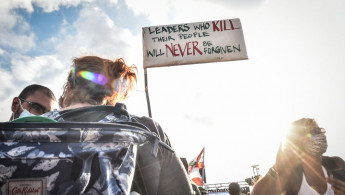Lebanon fails to elect a president as Hezbollah-supported and rival candidates 'fail to inspire change'
Lebanon’s parliament failed to pick a president for the 12th time on Wednesday after neither Hezbollah-supported candidate Sleiman Frangieh nor his main rival Jihad Azour garnered enough votes, in news that will not shock many Lebanese used to the endless stalling of their ruling class as they vie for power.
Lebanon has been without a president for eight months, preventing the country from forming a new government as it enters its fourth year of economic crisis.
Azour won 59 votes, while Frangieh won 51, both falling below the 86-vote threshold needed to win the presidency in the first round of voting under the Lebanese constitution.
Parliament Speaker Nabih Berri, an ally of Hezbollah, then adjourned the session, after MPs left the hall, saying the session had lost quorum.
Sleiman Frangieh, a Christian MP from the Marada party and former militia, has been Hezbollah’s pick for president for months. While he is supported by a number of Hezbollah's allies, he has not been able to garner support from the country’s anti-establishment opposition or major Christian forces.
A close friend of Syrian President Bashar al-Assad, he is criticised for being part of the traditional dynastic leaders of Lebanon earning the ire of anti-establishment opposition groups as well as the rival Christian Lebanese Forces and Free Patriotic Movement (FPM) who have a history of rivalry with Frangieh.
Azour, the former Minister of Finance and current head of the Middle East and Central Asia at the IMF, was floated as a candidate on 28 May by the FPM. The FPM was once a close ally of Hezbollah but their divergence on a number of issues, led by the choice for a presidential candidate, has seen them fall out often publicly in recent months.
The candidate has also since gained the support of the Christian Lebanese Forces and some but not all independent opposition MPs.
“Our worst enemy is the power vacuum so we need to elect a president as soon as possible. Between the two choices … we will go with Jihad Azour,” Najat Aoun, an independent MP, told The New Arab ahead of Wednesday’s vote.
Aoun said in a press conference on Tuesday that she would support Azour because he “believes in the logic of the state" in a veiled hint at the other side -- led by an armed militia -- operating outside the norms of Lebanon's system of government.
Is Jihad Azour an opposition candidate?
Azour is a technocrat and is viewed by some as a figure outside the Lebanese political elite, infamous for its endemic corruption and deal-cutting.
Not all anti-establishment MPs said they would support him, however. He served as finance minister under the government of Fouad Sanioura and is accused by many of complicity in economic policies that paved the way for the current crisis.
The anti-establishment opposition camp, which counts around 19 MPs in its ranks, is not a united tent, but they mostly agree on opposing mainstream political factions no matter where they fall in the pro- and anti-Hezbollah spectrum. For this reason, Azour has not been an inspiring candidate.
One of them, anti-establishment MP Halime Kaakour, said that she would support neither Frangieh nor Azour.
“I will not go along with the logic of ‘pragmatism’ which is incapable of prompting change," said Kaakour in a statement on 6 June.
What happens next?
Some analysts have said that Azour is not expected to reach the presidency, but is instead being used to “cancel out” Hezbollah’s candidate so that the group is forced to compromise on its presidential pick.
“In the next stage, we will have two solutions: Either we intensify the pressure to gather votes for Azour … or there will be a search for a new settlement. In this case, there might be agreement on a third candidate,” Rindala Jabbour, a spokesperson for the FPM, told TNA.
Aoun also said that she also would be open to “re-evaluating the situation” in terms of her support for a presidential candidate after Wednesday’s session.
Who a potential third candidate would remain to be seen, though former Minister of Interior Ziad Baroud and Head of the Army Joseph Aoun's names have both been floated in the past.
It is also now likely that the major factions on opposing sides would resort to fillibuster-like tactics, blocking quorum for next rounds by simply not showing up, unless a candidate is agreed in advance outside parliament.
Lebanon has been mired in an economic crisis since the autumn of 2019, when its banks froze depositors’ access to their accounts, essentially confiscating the savings of millions of Lebanese.
Since then, the national currency has lost over 95 percent of its value and two-thirds of the population has been plunged into poverty.
Lebanon has been engaged in on-again-off-again negotiations with the IMF to access an over $ 3 billion USD bailout package since 2020.
The country’s subsequent governments have failed to pass a single reform the IMF has said are perquisites to being granted international financing.
Lebanon’s next president will be expected to form a government which will break the political gridlock and pass necessary reforms to steer the country out of its economic and political crisis.





 Follow the Middle East's top stories in English at The New Arab on Google News
Follow the Middle East's top stories in English at The New Arab on Google News


